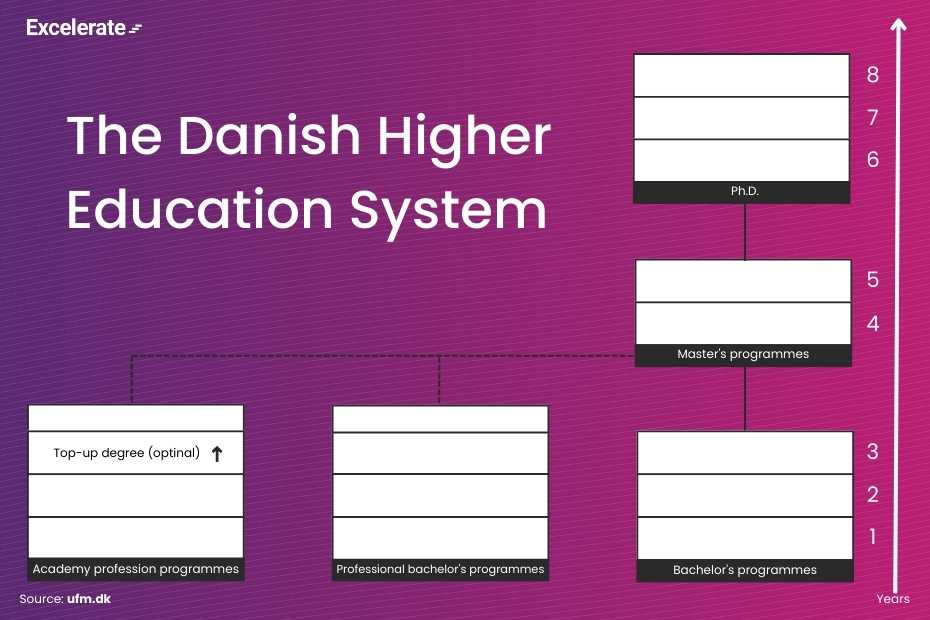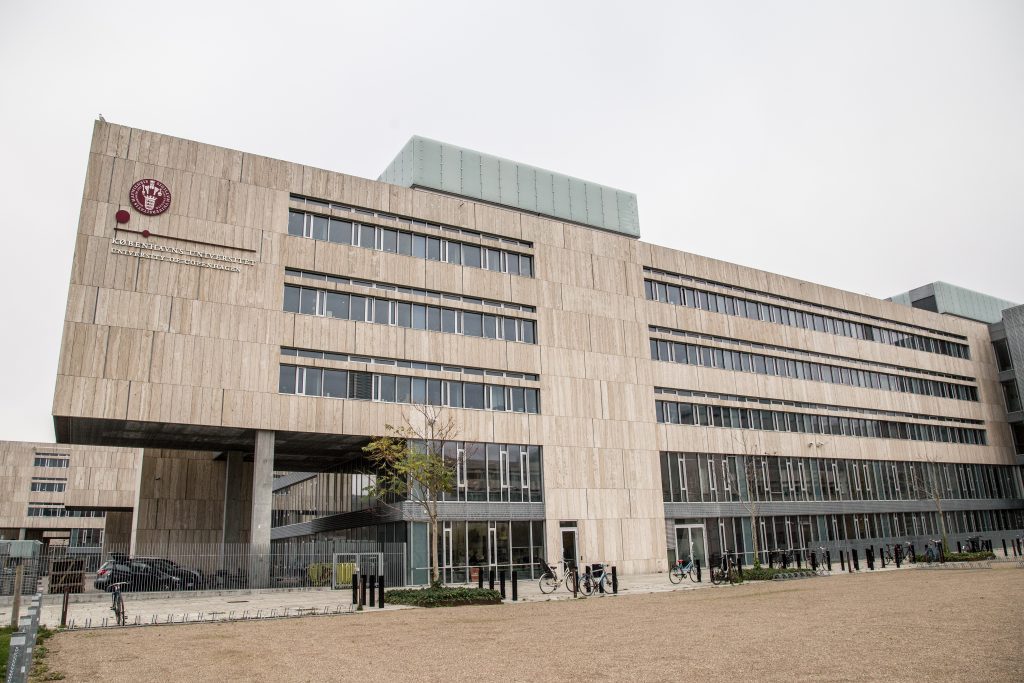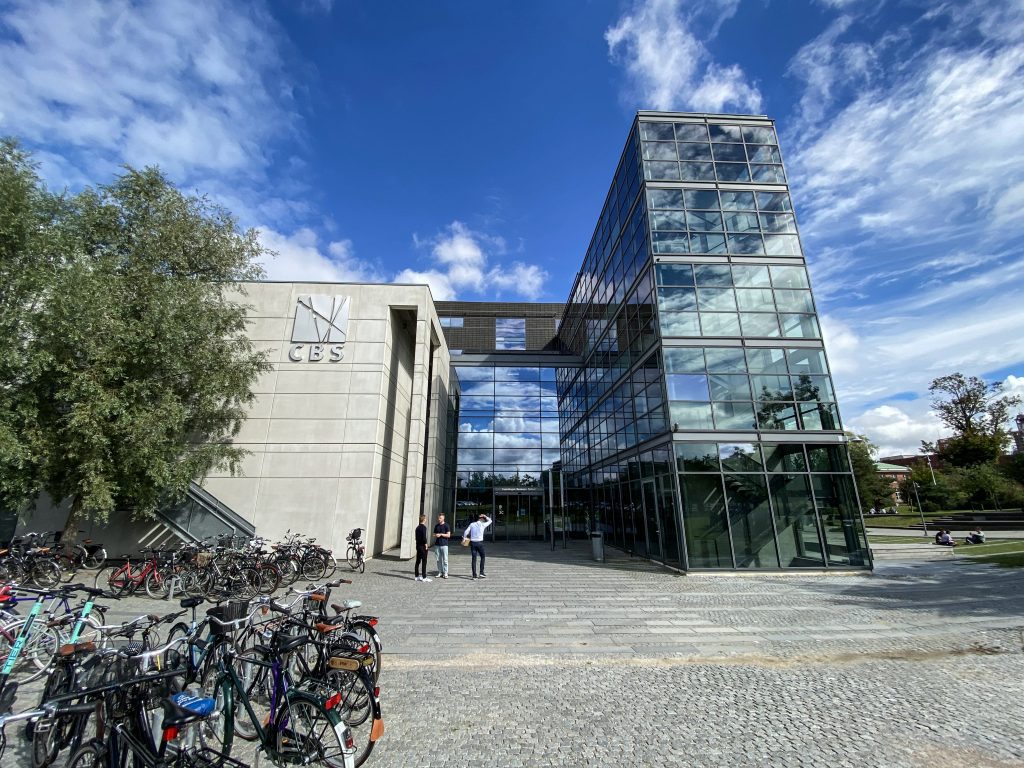The higher education system in Denmark – Overview of Danish education levels
Info and tips on student life in Denmark
Karoline Denning
Karoline is a student at the University of Copenhagen and is a content creator at Excelerate. Among other things, she is responsible for the Excelerate blog, content activities, and onboarding of students and companies.
The 8 higher education levels in Denmark
Here’s a list with all the higher education levels. Scroll down to read more about each higher education level in Denmark.
- Bachelor degree
- Candidate / Master degree
- Ph.D.
- Professional Bachelor’s degree
- Professional Academy degree
- Academy degree
- Top-up Bachelor degree
- Diploma degree
Overview and explanation of the Higher Education System in Denmark.
A Bachelor’s Degree (Bacheloruddannelse)
A bachelor’s degree is a research-based and full-time type of educational degree that typically lasts for three years.
ITU’s main entrance. Photo by Fausto Bottini
A Bachelor degree corresponds to 180 ECTS-credits and will give a student the respective professional knowledge. Moreover, the methodical and theoretical qualifications within a specific field. The purpose of the educational degree is to provide the university student with the capabilities to work within a chosen area.
There are two types of bachelor degrees: a bachelor of arts (BA) and a bachelor of science (BSc). You can typically do a BA within the areas of arts, languages, humanities, social sciences, history, communications, and etc. On the other hand, a BSc typically covers the areas of natural sciences, business and management, engineering, mathematics, informatics, and etc.
A great tip: you can sign up on Excelerate just before writing your bachelor thesis to get a thesis collaboration with a company. The best way to apply your knowledge to real-life business cases. Furthermore, to combine your thesis with your passion!
A Candidate’s Degree (Kandidatuddannelse)
A lot of people think that a Danish candidate’s degree is the same as a master’s degree. However, it’s not.
Søndre Campus of the University of Copenhagen. Photo by Fausto Bottini
A candidate’s degree is what the Danes call a ‘kandidat’. It’s a research-based, full-time program. A candidate degree typically lasts for two years and corresponds to 120 ECTS credits.
A candidate degree works as a progression to a lot of programs equivalent to a bachelor’s degree where you’ve got the ability to specialize within a certain field. Obviously, the aim is to develop your skills and expand your knowledge within that field. Hence, you can manage job tasks, which your candidate is targeted towards. After finishing your candidate you can either choose to work or educate yourself further with a Ph.D.
A Master’s Degree (Masteruddannelse)
Foreign universities often use the term ‘master’ equivalent to what we call a ‘candidate’.
Master students. Photo by Fausto Bottini
In Denmark, however, it’s something else although a master’s degree is considered to be on the same level as a candidate’s degree. Nevertheless, you’ll still hear of candidate programs in Denmark, which are called “Master of…”, because the program is English based.
Master’s degrees can be taken part-time, and you register for one module at a time. A Master degree is targeted toward adults with relevant, professional work experience. A master’s degree typically lasts for two to three years and corresponds to 60 ECTS credits. It’s a requirement that you’ve got an education on the level of a bachelor’s degree, at least, before starting on a master’s degree.
Also, there is a student fee for all master’s degrees. The classes can be scheduled in many different ways. The teaching can take the form of lectures, seminars, group work, and remote learning. In the end, you will be a master’s graduate!
A Ph.d. degree
A Ph.D. is an abbreviation for ‘doctor of philosophy’, which in Denmark is a bit of a misleading title since you’re not called a ‘doctor’ when finishing your Ph.D.
That is something you can call yourself after completing a doctor’s degree. However, if you complete a Ph.D. at a foreign university, you can call yourself a doctor because it means something else abroad. Highly confusing.
If you work on a Ph.D., you’ve signed up for three years of advanced research into a particular subject of your expertise. Make sure you pick a good thesis topic that are really interesting to you, otherwise those three years are going to feel like 10 years… Definitely use your creativity and passion on this one. A Ph.D. corresponds to 180 ECTS credits, and it’s a requirement that you’ve five years of study behind you.
There are different requirements when you work on a Ph.D. For instance, you’ve to take part in research communities and teach others in your subject. Moreover, to do your own research and lastly, finish your research with a Ph.D. thesis.
Teaching is mandatory when being a Ph.D. student. Photo by Fausto Bottini
A Professional Bachelor’s (Professionsbachelor)
You can study for a professional bachelor at a university college, which typically lasts for 3 years and 6 months. In most cases, a professional bachelor corresponds to 240 ECTS credits but others can also correspond to 180 or 210 ECTS credits. When studying for a professional bachelor’s you take part in an internship for 6 months minimum.
Moreover, the practical part, or the “hands-on” part, is a lot more in focus than the theoretical part when enrolling in a professional bachelor’s program. In particular, in comparison to a bachelor’s degree where the theoretical part is in focus. Nevertheless, a mix of theory and practice is still present.
Students. Photo by Fausto Bottini
A professional bachelor is targeted towards a very specific profession. There are currently about 85 different kinds of professional bachelor’s you can choose from in Denmark. As an example, after finishing a professional bachelor, graduates can get jobs as nurses, police officers, and physiotherapists.
Copenhagen Business School’s main faculty at Solbjerg Plads, Frederiksberg. Photo by Fausto Bottini
A Professional Academy Degree (Ervhervsakademiuddannelse)
A professional academy degree combines theory with practice and is targeted towards a specific profession. The educational degree typically lasts for two years, full-time, including a mandatory internship. It corresponds to 120 ECTS credits.
Students. Photo by Fausto Bottini
There are currently around 27 different kinds of professional academy degrees you can choose from in Denmark. If you hold a professional academy degree you get access to top-up bachelor’s degrees and other relevant diploma degrees.
An Academy Degree (Akademiuddannelse)
Although this educational degree sounds very similar to the above-described Professional Academy Degree, they are not identical.
Although both educational degrees are more or less on the same level, the requirements for an academy degree are different, as well as its primary target group.
This is typically an educational degree you take, as an adult while working, in order to specialize within a field of your work. It typically takes three years to complete, part-time. But some academy degrees can be completed full-time in one year. You register for one module at a time and the whole degree corresponds to 60 ECTS credits in total.
It’s required that you’ve vocational training (erhvervserfaring) or an education at the upper secondary level (gymnasium). Moreover, two years of relevant professional work experience is required as well. With an academy degree, you get access to diplomas and master’s degrees.
You’ll have to pay a student fee when enrolling at academy programs since they’re not SU entitled. You can take an academy degree in various kinds of areas.
Students working together. Photo by Fausto Bottini
A Top-up Bachelor’s Degree (Top-up bachelor)
A top-up bachelor’s degree program is a type of educational degree you can take as a progression of your professional academy degree. Or if you have vocational training. Hence, you’ll also get access to candidate’s or master’s degree programs, subsequently. A top-up bachelor’s degree takes 1 year and 6 months as a full-time study to complete and corresponds to 90 ECTS credits.
A Diploma Degree (Diplomuddannelse)
A Diploma Degree is a university degree that is targeted toward adults who have at least two years of relevant, professional work experience behind them. A diploma degree is on the same level as a bachelor’s degree or a professional bachelor’s. At a minimum, it’s a requirement that you hold an academy degree to be enrolled into a Diploma Degree.
This kind of university degree typically lasts for three years, part-time, and some diploma degrees can be taken full-time in one year. It corresponds to 60 ECTS credits. You can find classes in the evenings but also during the day and sometimes remote learning is available as well.
You can take diploma degrees within some fairly broad areas; leadership, sales and marketing, financial consulting, software development, etc.











